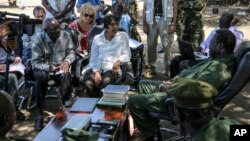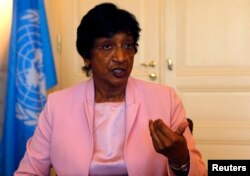Senior African human rights figures have created a group with an ambitious goal: to end impunity across the continent.
The Africa Group for Justice and Accountability was recently launched on the sidelines of the International Criminal Court (ICC) Assembly of States Parties in The Hague. The group comprises African experts in international criminal law and human rights law, and political figures.
Bettina Ambach, director of the Wayamo Foundation, which acts as the group's Secretariat, says members will support efforts to bring war criminals to justice through domestic and regional capacity building, outreach, and enhancing cooperation between Africa and the ICC.
Members of Africa Group for Justice and Accountability
Members of Africa Group for Justice and Accountability
- Athaliah Molokomme, attorney general of Botswana
- Former U.N. High Commissioner for Human Rights Navi Pillay of South Africa
- Tanzania’s Chief Justice Mohamed Chande Othman
- Hassan Bubacar Jallow of Gambia, prosecutor at the International Criminal Tribunal for Rwanda International Residual Mechanism for Criminal Tribunals
- Abdul Tejan-Cole of Sierra Leone, executive director of the Open Society Initiative for West Africa
- Fatiha Serour of Algeria, director of Serour Associates for Inclusion and Equity
- Richard Goldstone of South Africa, former chief prosecutor of the UN International Criminal Tribunal for Rwanda and the former Yugoslavia
- Hassan Bubacar of Gambia, prosecutor at the International Criminal Tribunal for Rwanda and International Residual Mechanism for Criminal Tribunals
- Femi Falana of Nigeria, human rights activist and lawyer
The group plans to meet in March next year with civil society organizations and NGOs across Africa as part of its capacity building objective.
In an interview with VOA, Botswana’s Attorney General Athaliah Molokomme explained the group's objectives.
“We are looking at the entire international criminal justice system, which is why our mission is to support efforts to strengthen justice and accountability measures in Africa…There is a special interest that the group has with issues to do with the International Criminal Court, because clearly the ICC is the only court at the moment at the international level that deals with issues of crimes against humanity, war crimes and so on,” said Molokomme.
“We are still talking about the very concrete ways in which we can contribute to strengthening or to supporting the effort to end impunity on the continent, the effort to ensure justice and accountability across Africa.”
Accusations of bias
Critics of the ICC say the Hague-based court is biased and often undertakes selective justice against Africans.They often note that more than 80 percent of the cases currently at the ICC are against Africans. The accusation and suspicion has generated tension between the African Union and the ICC.
Molokomme says the tension is regrettable.
“I don’t think there is really a conflict or contradiction inherently between the African Union [and the ICC].Its constitutive act, for example, says that the AU is committed in fighting impunity on the continent… So, in principle, the ICC should be a welcome institution for the AU,” said Molokomme.
Navi Pillay, the former U.N. High Commissioner for Human Rights and a leading member of the Justice and Accountability group, says members of the group will seek to improve cooperation between African countries and the ICC.
“I like the idea that we are going to be covering both domestic and regional capacity building across Africa, giving advice and outreach. This means we are going to be giving correct information that this will reach Civil Society Organizations… and NGOs,” said Pillay.
Concerns have been raised about how the group will raise funds to finance its activities. Some say the integrity of and impartiality of the group could be compromised if most of its financing comes from Western nations.
“It’s necessary we get the funding, but when you have reached this level of experience, there is no way we will lose our independence just because we are receiving funding,” said Pillay.





